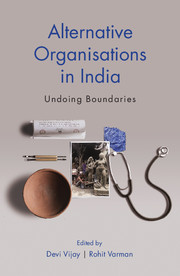Book contents
- Frontmatter
- Dedication
- Contents
- List of Tables and Figures
- Acknowledgements
- Chapter 1 Introduction: Undoing Boundaries
- Chapter 2 Formal and Informal Technologies of Alternative Organisational Spaces within the State: An Analysis of Violence, Wrongdoing and Policing
- Chapter 3 Scripting Alternative Images: Institutions, Practices and Scripts of the Mritshilpis of Kumortuli
- Chapter 4 Shelter for Homeless: Ethnography of Invisibility and Self-exclusion
- Chapter 5 Alternative Spaces of Employment Generation in India: Informal Rules, Structures, and Conflicting Organisational Requirements
- Chapter 6 Shaheed Hospital: Alternative Organisation, Ideology and Social Movement
- Chapter 7 Acting for Change: A Circuits of Power Analysis of a Denotified Nomadic Tribe and Budhan Theater's Struggle for Change
- Chapter 8 Swaraj: An Alternative University
- Chapter 9 Alternative Organisations: Spaces for Contestation
- Contributors
- Index
Chapter 8 - Swaraj: An Alternative University
Published online by Cambridge University Press: 05 April 2018
- Frontmatter
- Dedication
- Contents
- List of Tables and Figures
- Acknowledgements
- Chapter 1 Introduction: Undoing Boundaries
- Chapter 2 Formal and Informal Technologies of Alternative Organisational Spaces within the State: An Analysis of Violence, Wrongdoing and Policing
- Chapter 3 Scripting Alternative Images: Institutions, Practices and Scripts of the Mritshilpis of Kumortuli
- Chapter 4 Shelter for Homeless: Ethnography of Invisibility and Self-exclusion
- Chapter 5 Alternative Spaces of Employment Generation in India: Informal Rules, Structures, and Conflicting Organisational Requirements
- Chapter 6 Shaheed Hospital: Alternative Organisation, Ideology and Social Movement
- Chapter 7 Acting for Change: A Circuits of Power Analysis of a Denotified Nomadic Tribe and Budhan Theater's Struggle for Change
- Chapter 8 Swaraj: An Alternative University
- Chapter 9 Alternative Organisations: Spaces for Contestation
- Contributors
- Index
Summary
This chapter provides a case study of an alternative organisation – the Swaraj University, which not only critiques the neoliberal turn in modern Higher Education (HE) but also interrogates its colonial legacies, as part of the wider call towards decolonisation of education.
Understanding alternative organisations requires alternative ways of thinking of and about organisations. If the alternative organisation challenges modernity (modern industrial production system, standardisation, ‘scientific’ knowledge etc.) and colonialism, are the standard, always available, modern (and also its late or post- epochs and conditions, which are indexed in particular conceptions of modernity but not necessarily its rejection), ‘Western’, and colonising forms of organisational theorisation adequate? Can modern and colonising Organisation Theory (see Ibarra-Colado, 2006 for more) provide us with an adequate analytic of organisations that are premised in the rejection of modernity? In many ways, this chapter is not only an outline of an alternative organisation that is premised in the rejection of modernity and its assemblages (mainly modern capitalism, now neoliberal capitalism and colonialism), but also an outline of the limitations of Organisation Studies, which Burrell (1996) had correctly called NATO. The chapter helps in the mobilisation of alternate theoretical resources that are non- Western, decolonial and locally embedded.
The chapter is laid out as follows. In the following section, I trace the rise of global neoliberal university. In the next section, I outline key features of organisational practices and rehearse the existing critiques of such a set-up. The subsequent section provides an introduction to the Swaraj University. It discusses the philosophical ideas of anti-colonial thinkers such as Gandhi that undergirds the foundation and functioning of Swaraj University as an alternative organisation and describes its organising practices in contrast to that of modern neoliberal university. The final section provides a brief discussion on the ways in which Swaraj University presents an alternative to HE institutions, as well as a call for alternate non-Western theorisation of organisations, drawing on Ibarra-Colado's (2006) naming of ‘epistemic coloniality’ in and of organisations and Organisation Studies.
The global rise of the neoliberal university
Across the globe, there has been exorbitant rise in fees and increasing student debt in HE.
- Type
- Chapter
- Information
- Alternative Organisations in IndiaUndoing Boundaries, pp. 205 - 224Publisher: Cambridge University PressPrint publication year: 2017
- 1
- Cited by

